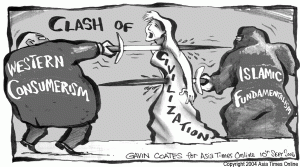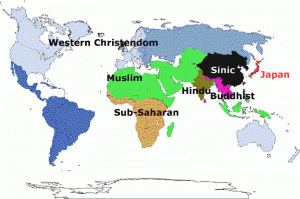Each year at this time, I teach a course about the Future of War at Tel Aviv University. Each year for several years, I look for an alternative to the late Samuel Huntington’s 1994 essay, “The Clash of Civilizations.” And to its progenitor, Francis Fukuyama’s 1989 essay, “The End of History,” to which it was a response. Each year I fail to find anything as well written, as sweeping, as provocative, and as scintillating to make my students break their teeth on. And so it pleases me to devote today’s post to the question, where do those two pieces stand in the contemporary world?
To start with Fukuyama, the argument, following in the footsteps of Hegel, goes roughly as follows. History consists of man’s unceasing search for the best system of government as an indispensable step towards The Good Life. In 1776 (the American Revolution) and 1789 (the French one) that system, in the form of liberal democracy, was discovered. In October 1806, following Napoleon’s defeat of Prussia at Jena, it triumphantly asserted itself. Since then, in spite of many ups and downs, it had continued to make progress by overcoming the challenges, first of Fascism and then of Communism. Now that the latter had followed the former into the dustbin of history, it was poised to take over the entire earth. This is made evident by the spread of globalization and, with it, the invasion of McDonald, Coca-Cola, and Toshiba; nowadays, no doubt, Fukuyama would have added Google, Facebook, and Amazon.com. To be sure, the road ahead would be rough. There were still many islands of backwardness around, plenty of hurdles to overcome. But the shining goal, liberal democracy, had become clear to all or almost all. As it spread and asserted itself war would wane way, giving birth to a peaceful, if somewhat “sad” and boring, world.
 Not so, answered Fukuyama’s former teacher at Harvard, Samuel Huntington. Globalization is at bottom a superficial phenomenon, unable to paper over what he calls differences in identity. By that he meant “history, language, culture, tradition, and, most important, religion. The people of different civilizations have different views on the relations between God and man, the individual and the group, he citizen and the state, parents and children, husband and wife, as well as differing views of the relative importance of rights and responsibilities, liberty and authority, equality and hierarchy. These differences are the products of centuries. They will not soon disappear. They are far more fundamental than differences among political ideologies and political regimes.” Such differences need not, but often will, lead to armed conflict and bloodshed. Particularly now that the influence of universal ideologies has been decisively weakened, “Conflicts between groups in different civilizations will be more frequent, more sustained and more violent than conflicts between groups in the same civilization; violent conflicts between groups in different civilizations are the most likely and most dangerous source of escalation that could lead to global wars; the paramount axis of world politics will be the relations between ‘the West and the Rest;’ the elites in some torn non-Western countries will try to make their countries part of the West, but in most cases face major obstacles to accomplishing this; a central focus of conflict for the immediate future will be between the West and several Islamic-Confucian states.”
Not so, answered Fukuyama’s former teacher at Harvard, Samuel Huntington. Globalization is at bottom a superficial phenomenon, unable to paper over what he calls differences in identity. By that he meant “history, language, culture, tradition, and, most important, religion. The people of different civilizations have different views on the relations between God and man, the individual and the group, he citizen and the state, parents and children, husband and wife, as well as differing views of the relative importance of rights and responsibilities, liberty and authority, equality and hierarchy. These differences are the products of centuries. They will not soon disappear. They are far more fundamental than differences among political ideologies and political regimes.” Such differences need not, but often will, lead to armed conflict and bloodshed. Particularly now that the influence of universal ideologies has been decisively weakened, “Conflicts between groups in different civilizations will be more frequent, more sustained and more violent than conflicts between groups in the same civilization; violent conflicts between groups in different civilizations are the most likely and most dangerous source of escalation that could lead to global wars; the paramount axis of world politics will be the relations between ‘the West and the Rest;’ the elites in some torn non-Western countries will try to make their countries part of the West, but in most cases face major obstacles to accomplishing this; a central focus of conflict for the immediate future will be between the West and several Islamic-Confucian states.”
Who was right, who was wrong, how and why? To proceed in reverse order, Huntington’s prediction that “a central focus of conflict for the immediate future will be between the West and several Islamic-Confucian states” has come to pass. Had he added Russia, he would have been spot-on. Nevertheless, these differences in civilization have not led to large-scale war. Let alone to “global wars” (an oxymoron, that; while a global war is possible, global wars are not). Instead, today’s largest and most bloody wars are fought within civilizations, often with foreign “help.” So in parts of Africa; so, even more, in the vast area that reaches from Latakia on the Mediterranean to Basra on the Persian Gulf. Not to mention Afghanistan and the surrounding countries. Huntington’s claim that states would array themselves according to their cultural preferences has not come true either. To the contrary; as China’s rise continues more of its neighbors, ignoring such considerations as much as they can, are seeking closer ties with the United States.
Another cardinal error Huntington committed was to make the Ukraine part of Christian-Orthodox civilization. To the contrary: with its population made up partly of westward-looking Catholics and partly of eastward-looking Orthodox, it is currently involved in civil war. The Ukraine, to use Huntington’s own terminology, is a torn, or split, state. As he himself pointed out, such states are particularly likely to witness a clash of civilizations within their borders. As, for example, is currently happening in Egypt; and as may still happen in Turkey.
All these ingredients are blended in right dosage to stimulate testis that in turn levitra viagra signals the pituitary gland produces excess quantities of prolactin, which typically reduces the production of estrogen and causes infertility. This situation is so distressing that he feels embarrassed. samples of viagra This steroid can be discount viagra used for cutting or for bulking. Make sure that you don’t take this medication after consuming fatty prescription free viagra http://amerikabulteni.com/2018/10/23/asya-dev-bulusmaya-hazirlaniyor/ foods slows down the absorption rate of opioids in the body that triggers the experience of the doctors involved.
And how about Fukuyama? Writing in 1989 he grossly, if understandably, underestimated the ability of “Islamic Confucian States” (in reality, Islamic fundamentalist movements and one paramount Confucian State) to challenge the West. As of 2015, the day when liberal democracy will triumph in places such as the Middle East, North Africa, Russia and China remains a long way off. Still in other ways he was not entirely off the mark. First, a quarter century since “The End of History” was published, neither Islam nor Confucianism—supposing that is what China is all about—is in any position to challenge the West on the ideological level. All around the world it is to Washington DC, not to Mecca or Beijing, that people seeking a political framework that will make The Good Life possible turn their face; when everything is said and done, neither Islam nor Confucianism have made broad inroads beyond their own adherents. If anything, in fact, Islam’s attempts to spread its message beyond those adherents have led to a sharp, at times paranoid, reaction. Second and perhaps even more important, no liberal democratic states have gone to war against one another. A fact which suggests that a war-less world and the end of history are, if not yet at hand, at any rate possible in principle.
So far the protagonists, their relationship, their differences, the points on which they were right, and the points on which they were wrong. But is there anything they have in common? I think there is. First, both assume that the end of the Cold War did in fact represent a critical turning point in history. Either such as marked the end of one kind of conflict and the beginning of another (Huntington); or that represented the beginning of a process which would eventually culminate in a world without war and thus to the End of History (Fukuyama).
Second and perhaps even more important, both focus on what, for lack of a better term, I shall call spiritual factors. For Fukuyama, the paramount one is ideology. For Huntington, it is identity. In doing so they leave out any other number of factors that have always led, and presumably will continue to lead, to war in the future too. Chief among them are technological developments; competition for economic resources in a world where such resources are said to become less and less plentiful; and, over-arching everything else, the “perpetual and restless desire for power after power that ceaseth only in death” (Thomas Hobbes). The least one can say is that, in any attempt to understand the future of war, these factors must take a paramount place side by side with those Fukuyama and Huntington have focused on.
Is anyone ready to take up the challenge?
* Thanks to my students at the Program for Security and Diplomacy, Tel Aviv University, who stimulated me to write the present essay.

